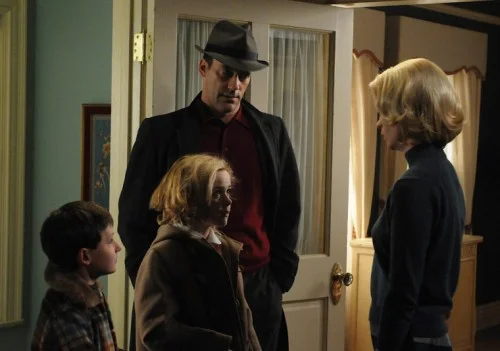What was the meaning of Betty’s sad sigh at the dollhouse? What’s going on inside Roger Sterling’s head? Who in their right mind would drive a Honda?! Kate breaks it down. Watch out for spoilers!
THIS WAS A HARD EPISODE TO WATCH. Roger’s racist outbursts, Betty’s continual failures as a parent, and Sally’s lonely drifting toward the edge of adulthood all converged to make something almost ugly to experience.
Roger Sterling, expertly played by John Slattery, is a charm machine of a character most other shows would kill to have. But on Mad Men, he’s just one of countless characters covering up a bottomless well of pain with a sophisticated exterior. He knows that he inherited his career and firm partnership from his father rather than by virtue of his own hard work. He’s aware of how he failed in his first marriage and how his second marriage to a woman half his age is perceived by his peers. Most of the time, he seems to not care about these particular truths, and his easygoing attitude is part of what makes him so enjoyable. His blackface routine in season 3 was incredibly embarrassing, but he didn’t care. However, Roger was having absolutely no fun this week as his fellow partners navigated some culturally tricky negotiations with Honda. His barbs about bombing the Japanese were much angrier than his usual tossed-off witticisms. How much the Honda executives understood is unclear, but I bet their translator got every word.
It seems like the writers wanted us to believe that Roger was using his war experience as an excuse to cover up his fear about being eclipsed by Pete as a partner and account man. And to be fair, I think that’s a big part of why Roger lashed out at Honda. But I also think that maybe being a soldier in WWII was one of the few things that Roger ever did on his own and did well. If the conflict that drove the best and proudest time of Roger’s life is already so far behind us that SCDP can sit down at a table and do business with America’s former enemies, then Roger is even more obsolete than he may have realized.
Over in the Draper/Francis home, Sally and Betty have never felt farther apart, but they are becoming more and more alike. (In that respect, they are an extremely normal mother and daughter. Am I right, ladies?) Betty is almost notorious at this point in the series for being more child than adult. She stands in sharp contrast to increasingly independent women like Peggy and Joan, as she has spent her entire character arc practically begging for somebody to take away her agency. She wants to be kept and cared for, like the dolls in the dollhouse she stared at so longingly in the psychiatrist’s office. Betty cannot understand why Sally won’t behave more like the little doll daughter she always wanted, but what infuriates Betty the most about Sally may be how similar Sally is to her. Betty slaps Sally for cutting her hair, completely missing the fact that Sally’s hair is now the same length as her own. She chastises Sally for touching herself at the sleepover, but does anyone else remember Betty cozying up to the washing machine in the first season when she was missing Don? It is often said that the things we dislike in other people are the things we dislike in ourselves. I’m afraid that the more like her mother Sally becomes, the more problems they are going to have.
Woven throughout these intensely personal stories was the Honda plot, where Japanese and American businessmen tried to deal with each other despite multiple barriers of culture, language and authority. It seemed to me on first viewing that the men from Honda were being deliberately difficult (as I often feel about the company executives that hire Sterling Cooper). They held all the cards as they dictated a set of rules for each firm to follow, and Bert Cooper had to constantly remind everybody to show deference and respect in order to stay in the negotiations.
I had to remind myself that the Japanese weren’t necessarily being unreasonable; they were simply acting according to their culture. In some ways, their attitudes and actions were predetermined by their upbringing generations before they ever got to the table with SCDP. Likewise, Roger and Betty, while their behaviors may not have been very palatable, cannot bear exclusive blame for the way they acted this week. They, too, are products of their environments. Will Sally, a child being raised in a decade of massive upheaval, be able to break the cycle? And if she does, can she rise above her upbringing, or will she end up doing more damage to herself than her parents ever could have?
Photos: amctv.com


Leave a Reply